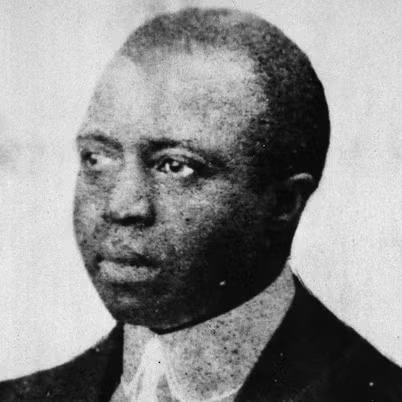
Table of Contents
Who Was Scott Joplin?
Scott Joplin, born in the late 1860s along the border between Texas and Arkansas, was a prominent American composer and pianist who significantly shaped the genre of ragtime music. He began his musical journey as a child, quickly mastering the piano and developing his skills as a traveling musician during his teenage years. Joplin immersed himself in the evolving musical style of ragtime, ultimately becoming its leading composer. His notable works include iconic pieces such as “The Entertainer,” “Solace,” and “The Maple Leaf Rag,” the latter being recognized as the best-selling ragtime song in history. In addition to his contributions to instrumental music, Joplin also composed operas, including Guest of Honor and Treemonisha. He passed away in New York City on April 1, 1917.
Musical Family Background
Although the exact details of Scott Joplin’s birth remain uncertain, it is widely believed that he was born between June 1867 and January 1868. He was the son of Florence Givens and Giles Joplin and grew up in Texarkana, a town situated on the border of Texas and Arkansas. The Joplin family was musically inclined; Florence was a singer and banjo player, while Giles played the violin. Scott exhibited an early aptitude for music, learning to play the guitar before transitioning to the piano. He received further instruction from Julius Weiss, a German music teacher in his hometown. In addition to piano, Joplin was also a vocalist and played the cornet.
During his teenage years, Joplin left home to pursue a career as a traveling musician, performing in bars and dance halls where emerging musical forms laid the groundwork for ragtime. This genre is characterized by its distinct syncopated rhythms and fusion of various musical influences. In the 1880s, Joplin spent time in Sedalia, Missouri, and made a notable appearance in Chicago in 1893, leading a band at the World’s Fair. He later returned to Sedalia, where he continued to compose music, resulting in the publication of his first two songs, “Please Say You Will” and “A Picture of Her Face.”
Writing Huge Hit: “Maple Leaf Rag”
Scott Joplin, an influential figure in American music, studied at Sedalia’s George R. Smith College for Negroes during the 1890s. He not only honed his craft as a composer but also took on the role of teacher and mentor to fellow ragtime musicians. In the late 1890s, Joplin published his first piano rag, “Original Rags,” though he was compelled to share credit with another arranger. Determined to assert his rights, he collaborated with a lawyer to secure a one-cent royalty for every copy of his next composition, “The Maple Leaf Rag.” In 1899, Joplin partnered with publisher John Stark to promote the piece. Although initial sales were modest, “Maple Leaf Rag” eventually became the most successful ragtime song in history, selling over a million copies.
Following this success, Joplin continued to compose within the ragtime genre, which was rapidly gaining popularity across the United States. His artistic contributions were met with increasing acclaim, resulting in a number of published works, including “The Entertainer,” “Peacherine Rag,” “Cleopha,” “The Chrysanthemum,” “The Ragtime Dance,” “Heliotrope Bouquet,” “Solace,” and “Euphonic Sounds.”
Opera Ambitions
Joplin was deeply invested in elevating the perception of ragtime, particularly in response to the derogatory remarks made by some white critics regarding the music’s African American roots and innovative style. To address these issues, he published “The School of Ragtime: Six Exercises for Piano” in 1908, a series designed to educate students about the complexities of ragtime.
Additionally, Joplin aspired to create long-form musical works. He published the ballet “Rag Time Dance” in 1902 and produced his first opera, “A Guest of Honor,” for a Midwestern tour in 1903. Unfortunately, the production was abruptly halted due, in part, to the theft of box-office receipts, leading Joplin to suffer significant financial losses.
By 1907, Joplin had moved to New York in hopes of securing funding for his next opera, “Treemonisha.” This ambitious multi-genre project depicted the life of a rural African American community near Texarkana. Considered a precursor to George Gershwin’s “Porgy and Bess,” “Treemonisha” was presented in a scaled-down version featuring voice and piano in 1915, but it would not receive a full theatrical production for many years.
Final Years and Legacy
In the following years, Joplin continued to explore various musical forms and established his own publishing company with his third wife, Lottie, in 1913. However, by 1916, he began to suffer from the debilitating effects of syphilis, which he had likely contracted years earlier. His health deteriorated, leading to hospitalization and institutionalization. Joplin passed away on April 1, 1917.
Ragtime experienced a revival in the 1940s and surged in popularity during the 1970s, particularly as a classical genre. Its influence permeated popular culture, notably with “The Entertainer” serving as the theme for the film “The Sting,” featuring Paul Newman and Robert Redford. In 1975, Joplin’s “Treemonisha” was finally staged on Broadway. The following year, he was posthumously awarded a special Pulitzer Prize, recognizing the profound impact of his work in shaping a genre that has influenced generations of music.
